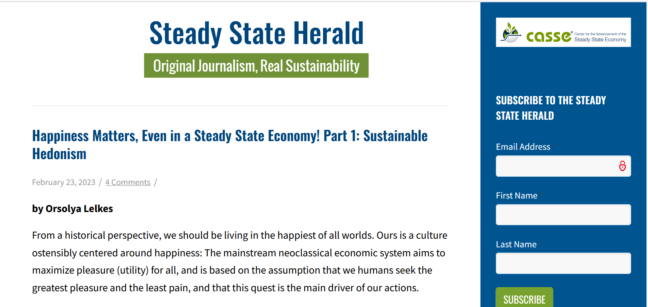This post was originally published on the Steady State Herald blog, 23rd February 2023.
From a historical perspective, we should be living in the happiest of all worlds. Ours is a culture ostensibly centered around happiness: The mainstream neoclassical economic system aims to maximize pleasure (utility) for all, and is based on the assumption that we humans seek the greatest pleasure and the least pain, and that this quest is the main driver of our actions.
Happiness has also been a philosophical, political, and personal striving for centuries. In the American Declaration of Independence, the “Pursuit of Happiness” is named as an unalienable right of humans, next to life and liberty. And today, the science of happiness is booming. On a personal level, the science of positive psychology offers a large range of tools that can support us in cultivating a joyful and meaningful life.
Happiness is relevant to steady state economies even though they do not focus on wellbeing as such. The quest for happiness, joy, and pleasure is an elemental life force. Who would not want to be happy? To create a profound systemic transformation, a positive, forward-looking narrative is essential to inspire and motivate individual and collective action, and this narrative would ideally offer some sense of happiness.
Many fear that shifting to a “green lifestyle” or reducing material consumption will bring a decline in wellbeing. I argue that it may be the other way round, that simplicity can advance happiness. But for this, we need to adjust our notion of happiness as well as our strategies for pursuing it.
Continue reading ‘Happiness Matters, Even in a Steady State Economy! Part 1: Sustainable Hedonism’ – Steady State Herald
